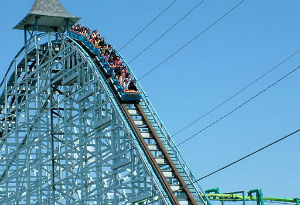GCSE results 2016: A*-C grades take dramatic dive
- Emma Finamore
- 25 Aug 2016
Proportion of C grades or above drops by a shocking 2.1 percentage points as new policies come into force

GCSE results have fallen dramatically, with the proportion of those gaining a C or above dropping by an unprecedented 2.1 percentage points compared to last year, including a sharp decline in the numbers gaining a C or above in English.
This can be explained – at least in part – by the new government policy that forces 17-year-olds who got a D or lower in English or maths last year to resit those tests, meaning more students overall were sitting the exams this year.
But some of the fall is unexplained. Of pupils taking their exams in year 11, the normal GCSE year, the proportion gaining A*-C grades was still down by 1.3 percentage points.
Michael Turner, Director General of the Joint Council for Qualifications, said: “There is significant movement in this year’s entries, which impacts on results and creates a very complex national picture.
“We see shifts not only between subjects, but also across qualifications and year groups. This is driven by several factors, including performance measures and resit policies in England.”
Here are the results broken down by major subjects:
Sciences
At grade A*-C, Biology is down 0.4 percentage points, Chemistry down 0.9 percentage points and Physics down 1.1 percentage points.
Entries for the combined Sciences grew significantly, with Additional Science up 10.5% to 368,033. There was also a 22.5% growth in the number of entries by 16 year olds in Science, from 208,192 to 254,964. School and college performance measures are likely to be drawing students into Science GCSEs from other science qualifications on offer.
Maths
Outcomes in Mathematics for all candidates decreased 0.4 percentage points at grade A*, 0.6 percentage points at grades A*-A, and 2.3 percentage points at grades A*-C. Entry patterns have a significant impact on outcomes in Mathematics. The increase in 17 year olds (and older) resitting is reflected in a 6.3 percentage point drop at A*-C for this age group. However, 29.5% of 17 year olds (and older) achieved their grade C.
The proportion of 16 year olds achieving grades A*-C increased by 1.4 percentage points (with increases of 1.1 percentage points at grades A*-A, and 0.3 percentage points at grade A*).
English
Overall, outcomes for English have risen at A* by 0.2 percentage points to 3.3%, declined at A*-A by 0.9 percentage points to 13.7% and down 5.2 percentage points at A*-C to 60.2%.
Geography & History
Outcomes are down by 2.8 percentage points for Geography and 3.0 percentage points for History at A*-C, suggesting that the entries now comprise a wider range of abilities.
Modern Languages
At A*-C, French outcomes are down 1.1 percentage point to 69.7%, German down 0.6 percentage points to 74.0% and Spanish down 2.3 percentage points to 70.9%.
The Spanish decline is likely to be the result of the rise in entries and a more varied group taking the exams, with varying abilities.
The decline can be explained – at least in part – by the new government policy that forces 17-year-olds who got a D or lower in English or maths last year to resit those tests, meaning more students overall were sitting the exams this year.
Sciences
At grade A*-C, Biology is down 0.4 percentage points, Chemistry down 0.9 percentage points and Physics down 1.1 percentage points.
Entries for the combined Sciences grew significantly, with Additional Science up 10.5% to 368,033. There was also a 22.5% growth in the number of entries by 16 year olds in Science, from 208,192 to 254,964. School and college performance measures are likely to be drawing students into Science GCSEs from other science qualifications on offer.
Maths
Outcomes in Mathematics for all candidates decreased 0.4 percentage points at grade A*, 0.6 percentage points at grades A*-A, and 2.3 percentage points at grades A*-C. Entry patterns have a significant impact on outcomes in Mathematics. The increase in 17 year olds (and older) resitting is reflected in a 6.3 percentage point drop at A*-C for this age group. However, 29.5% of 17 year olds (and older) achieved their grade C.
The proportion of 16 year olds achieving grades A*-C increased by 1.4 percentage points (with increases of 1.1 percentage points at grades A*-A, and 0.3 percentage points at grade A*).
English
Overall, outcomes for English have risen at A* by 0.2 percentage points to 3.3%, declined at A*-A by 0.9 percentage points to 13.7% and down 5.2 percentage points at A*-C to 60.2%.
Geography & History
Outcomes are down by 2.8 percentage points for Geography and 3.0 percentage points for History at A*-C, suggesting that the entries now comprise a wider range of abilities.
Modern Languages
At A*-C, French outcomes are down 1.1 percentage point to 69.7%, German down 0.6 percentage points to 74.0% and Spanish down 2.3 percentage points to 70.9%.
The Spanish decline is likely to be the result of the rise in entries and a more varied group taking the exams, with varying abilities.
News
- Do apprentices get enough support?
- 10 best universities for getting a job
- Careers mentoring app goes national
- Four in five graduates say their gap year made them more employable
- National Apprenticeship Week: Apprentices Earn Almost £4K More than Grads in their First Jobs
- University a ‘Disaster’
- Exclusive: Exam stress tips from a teen confidence & mental health expert
- Winners announced at the School Leaver Awards 2017
- Government confirms funding for EU students for 2018-2019 despite Brexit
- A-level results day 2016: A-level re-marks